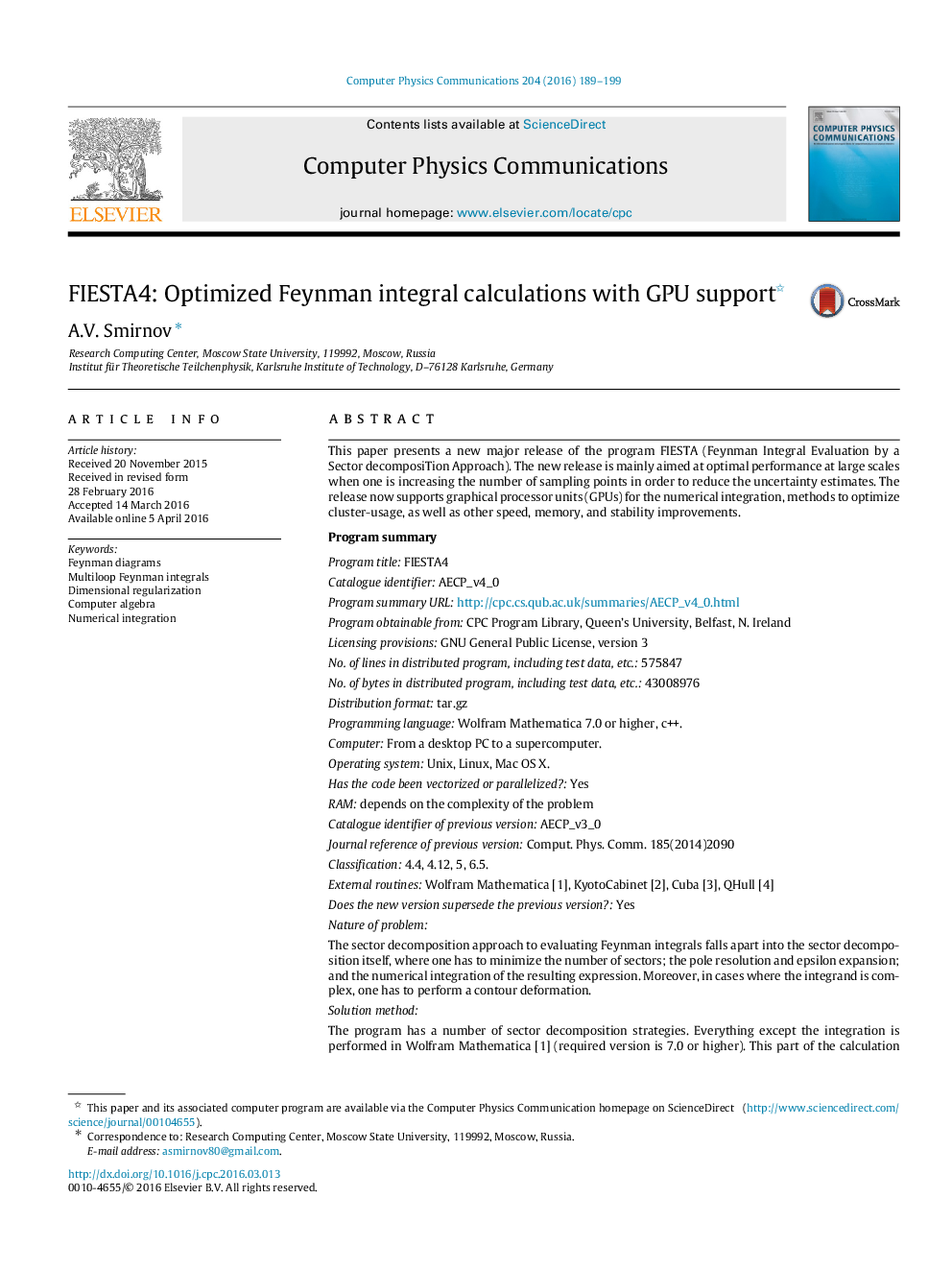| کد مقاله | کد نشریه | سال انتشار | مقاله انگلیسی | نسخه تمام متن |
|---|---|---|---|---|
| 502206 | 863688 | 2016 | 11 صفحه PDF | دانلود رایگان |

This paper presents a new major release of the program FIESTA (Feynman Integral Evaluation by a Sector decomposiTion Approach). The new release is mainly aimed at optimal performance at large scales when one is increasing the number of sampling points in order to reduce the uncertainty estimates. The release now supports graphical processor units (GPUs) for the numerical integration, methods to optimize cluster-usage, as well as other speed, memory, and stability improvements.Program summaryProgram title: FIESTA4Catalogue identifier: AECP_v4_0Program summary URL:http://cpc.cs.qub.ac.uk/summaries/AECP_v4_0.htmlProgram obtainable from: CPC Program Library, Queen’s University, Belfast, N. IrelandLicensing provisions: GNU General Public License, version 3No. of lines in distributed program, including test data, etc.: 575847No. of bytes in distributed program, including test data, etc.: 43008976Distribution format: tar.gzProgramming language: Wolfram Mathematica 7.0 or higher, c++.Computer: From a desktop PC to a supercomputer.Operating system: Unix, Linux, Mac OS X.Has the code been vectorized or parallelized?: YesRAM: depends on the complexity of the problemCatalogue identifier of previous version: AECP_v3_0Journal reference of previous version: Comput. Phys. Comm. 185(2014)2090Classification: 4.4, 4.12, 5, 6.5.External routines: Wolfram Mathematica [1], KyotoCabinet [2], Cuba [3], QHull [4]Does the new version supersede the previous version?: YesNature of problem:The sector decomposition approach to evaluating Feynman integrals falls apart into the sector decomposition itself, where one has to minimize the number of sectors; the pole resolution and epsilon expansion; and the numerical integration of the resulting expression. Moreover, in cases where the integrand is complex, one has to perform a contour deformation.Solution method:The program has a number of sector decomposition strategies. Everything except the integration is performed in Wolfram Mathematica [1] (required version is 7.0 or higher). This part of the calculation is parallelized with the use of shared memory. The database is stored on hard disk with the use of the KyotoCabinet [2] database engine.The integration part of the algorithm can be performed on a cluster. It is written in c++ and does not need Wolfram Mathematica. For integration we use the Cuba library package [3].The sampling point evaluation has been vectorized. It can also use graphical processor units for the parallelization of sampling point evaluation.Reasons for new version:The main reason for the new version is the possibility to use GPUs for faster calculations.Summary of revisions:The main improvements are performance-related. The integration in the new version works 2–4 times faster, and another 2–4 times faster if one uses a GPU. Also there are multiple stability improvements.Restrictions:The complexity of the problem is mostly restricted by CPU time required to perform the integration and obtain a proper precision.Additional comments:For additional information see, http://science.sander.su, https://bitbucket.org/fiestaIntegrator/fiesta/overviewRunning time:Depends on the complexity of the problem.References:[1]http://www.wolfram.com/mathematica/, commercial algebraic software;[2]http://fallabs.com/kyotocabinet/, open source;[3]http://www.feynarts.de/cuba/, open source;[4]http://www.qhull.org, open source.
Journal: Computer Physics Communications - Volume 204, July 2016, Pages 189–199